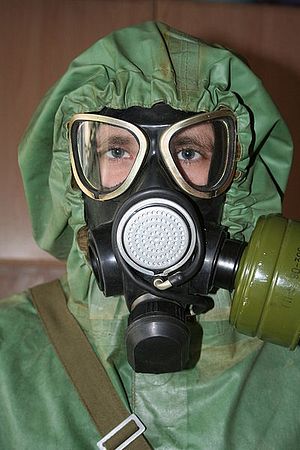In a regular press conference on Thursday, China’s Foreign Ministry Spokeswomen Hua Chunying announced that China will be sending one or more naval vessels to escort the Syrian chemical weapons stockpile on their Mediterranean voyage. Hua called the decision “another important move by China” in implementing relevant United Nations decisions.
The news was also reported in Chinese media outlets. The initial Global Times report, reposted by Xinhua, summarized the recent update on Syria from the Organization for the Prohibition of Chemical Weapons (OPCW), with the added information that Russia and China will provide naval escorts. The article interviewed Chen Kai, secretary-general of the China Arms Control and Disarmament Association, for his take. Chen noted that China’s participation in the mission will mark the first time that China has assisted in transporting chemical weapons for destruction. Even more importantly, China will be providing a naval escort in the Mediterranean Sea for the first time.
Chen commented that China was “chosen” for this duty for two reasons: China’s navy has “strong naval escort capabilities” and China has international experience in naval escorts for its anti-pirate patrols in the Gulf of Aden. For Chen, China’s naval escort for the Syrian chemical weapons is an “embodiment of China’s international status, because not everyone who wants to participate in this activity can do it.”
An editorial published in Xinhua went even further in praising China for its role in the destruction of Syrian chemical weapons. The editorial called China’s commitment to provide naval escort vessels “a landmark development in favor of world peace and stability.” The OPCW, the author added, “welcomed China’s contribution in this regard.” Anyone reading these articles would naturally come to the conclusion that China is playing a leading role in organizing and supporting the destruction of Syria’s chemical weapons stockpiles.
Actually, looking at the OPCW’s statement from Tuesday, we get an entirely different picture. First, the OPCW does not specifically thank China (or any other country) for its contribution, despite what the Xinhua editorial implied. In presenting the OPCW’s plan for the destruction of chemical weapons, Director-General Ahmet Üzümcü noted that “the assisting State Parties have, in the interest of the common good, assumed onerous responsibilities.” His thanks go to all assisting State Parties, not just China.
So what “onerous responsibilities” did China assume? According to Uzumcu’s remarks, not many. The only mention of China is a note that “China is providing surveillance cameras and 10 ambulances” to assist with monitoring transportation of the chemical weapons within Syria. Neither Uzumcu nor the United Nations’ press release make any mention of China sending naval escort vessels. Instead, Uzumcu reports that “Denmark and Norway will provide vessels and military escorts for the maritime transportation of the Syrian chemicals.” There is no mention that these countries were “chosen,” for naval prowess or any other reason, in contradiction to Chen Kai’s statement.
Meanwhile, the U.S. is providing a naval vessel to serve as destruction site for the most toxic chemicals, as well as sending container drums, GPS locators, and loading, transportation, and decontamination equipment to help with the process of moving the chemicals within Syria’s borders. Russia is “providing large capacity and armored trucks, water tanks, and other logistical supplies,” and Finland will send an emergency response team in case of an accident. (However, an unnamed European diplomat did tell the New York Times that China and Russia have agreed to provide naval escorts.)
Still, based on OPCW’s official report, it appears that China’s contribution to the destruction of Syrian chemical weapons is actually smaller than that of other countries, particularly when considering the size of China’s economy and its military capabilities. Yet Chinese officials and media outlets seem to feel China’s modest contributions are earth-shaking and even world-changing.
There continues to be a disconnect between China’s perceptions of its own actions and responsibilities and the viewpoint of the international community. China clearly feels its decision to send naval escort vessels, surveillance cameras, and ambulances to Syria is not just an appropriate but a praise-worthy contribution to the global effort to destroy Syria’s chemical weapons stockpiles. Yet when compared with other countries’ responses, China’s actions seem underwhelming. The same arguments have been made over many other global issues, from nonproliferation in North Korea to the global battle against climate change. China will say it is doing all it can, and even breaking historic new ground, while other countries (particularly in the West) ask why the world’s most populous country, with the second-largest economy, can’t contribute more.
To China’s leaders, China is still a developing country. Leadership will only devote so many resources to international efforts when China still has many domestic issues to deal with. Accordingly, China is generally is satisfied with whatever contributions it can make. On the other hand, Western nations have lately taken to rolling their eyes at China’s self-identification as “developing.” From their perspective, China has already arrived on the world stage and should be doing more to ensure global peace and stability.
China’s strange media interpretations of the OPCW statements show this disconnect. The OPCW’s one sentence description of China’s contribution plus its thanks for the help of “the assisting State Parties” turned into “commending China” or “welcoming China’s contribution.” Apparently, China felt its contribution was deserving of thanks, which was not forthcoming from the international community. So Beijing patted itself on the back on behalf of the OPCW.

































